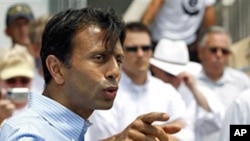There were commemorations all along the U.S. coast along the Gulf of Mexico Wednesday to observe the first anniversary of the accident on the Deepwater Horizon oil drilling platform that killed 11 people and led to the biggest oil spill in history. The debate continues over how to carry out underwater oil drilling operations safely and how to restore the damaged areas.
Appearing with local and state officials at a marina in Grand Isle, Louisiana, the state's governor, Bobby Jindal, spoke of the explosion and fire on the Deepwater Horizon and the pain it caused many families in the area.
"A year ago today in this tragedy, 11 men lost their lives," said Jindal. "Nothing can bring those men back. We need to keep not only those men, but their families, in our prayers. We are talking about husbands, sons; we are talking about loved ones that will never come back. And I know that today is a very difficult day for these families."
The Deepwater Horizon was operated by BP, one of the world's largest oil companies, headquartered in London. The company sold off some of its assets last year to help pay $20 billion to a U.S. government-administered trust fund to compensate fishing and seafood boat owners, workers and others affected by the spill.
The environmental effects of the spill continue to plague some areas along the Gulf coast. Before the leaking well was capped, 87 days after the accident, officials estimate it poured nearly five million barrels of oil into the Gulf. Hundreds of kilometers of delicate wetlands were soaked in oil and many areas have yet to recover. Tar balls continue to wash up on beaches, and animal rescue teams still treat oil-soaked dolphins, turtles and other creatures.
Governor Jindal says BP needs to do more to fulfill its promise to Louisiana and other states along the coast that it will pay for the restoration of damaged areas.
Jindal said Wednesday that BP has not started on projects aimed at restoring oyster beds and reefs, even though the company has spent millions of dollars on television commercials that tout its commitment to the Gulf's restoration.
"We continue to call on BP to fulfill the promises of their ads," he said. "We continue to call on BP to truly make it right."
But for many people in coastal Louisiana, the biggest impact from last year's disaster was the moratorium on deep-water oil drilling imposed by the Obama administration as part of an effort to prevent any further offshore drilling accidents. The moratorium was lifted in October, but very few permits have been issued since then. Oil and gas companies say they are prevented from moving quickly to ramp up production by new rules and regulations.
Thousands of people in Louisiana have found good-paying jobs in energy production since offshore operations expanded along the Gulf coast a few decades ago. In addition, many local companies rely on contracts from oil and gas companies to continue their operations.
But some Louisiana residents argue that the environmental costs associated with the oil and gas industry are too high and that the state should diversify its economy away from energy. Environmental groups are chiding the government for not going far enough to impose new safety measures on the petroleum industry. Obama administration officials say new rules being prepared will do more to ensure offshore drilling safety and allow operations in the Gulf to continue. The Gulf of Mexico accounts for about 30 percent of U.S. domestic oil production.
Victims and Damage from BP Oil Spill Remembered One Year Later
- By Greg Flakus











